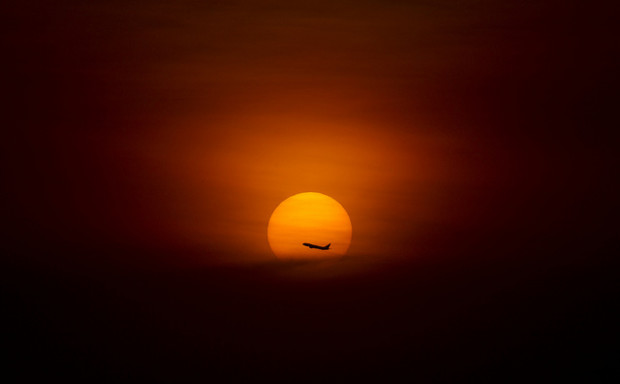You have no items in your cart. Want to get some nice things?
Go shopping
We drive out beneath a sky the colour of builders’ slurry. On the vast fringes of the city, where shanty towns roll out like a densely woven carpet, thunderheads amass. There they prepare to make their assault. Monsoon. That word. Like the distant firing of a canon and the slow echo that follows. The scouts have arrived early this year; laying mines, doing recon, seeding dissent. One of them brought down a plane. My son was on it.
A hire car. These roads. We stop for cows and for trains and are each time crashed upon by a tide of beggars. Open hands arrive at our windows and behind them the sullen faces, though which hands belong to which face is unknowable. It is a great spider of a hundred arms and a hundred eyes. Or perhaps the incarnation of one of their gods. A god of desperation. Or a malevolent god of chaos. They have those.
We move on, and the desolation of the shanties peters out but the traffic remains its own shifting, shouting city whose rulers are mad trucks and gaudily decorated buses and whose citizenry is fumes and anxiety.
She keeps her eyes fixed to her passenger side window. At the sound of a loud truck horn beside or behind us she will start out of her reverie before returning again to the quiet, invisible muslin of her grief.
Inside the car all is silent. No speaking. I try to think of them speaking together. Laughing, pressing their faces. Whispering the special baby names they had for each other. Everyone always seeking the other who will allow them to be the child they used to be in the arms of their mother. But now she is broken apart; disjointed. She appears to me like a hazy figure in someone else’s opium stupor; indistinct, losing dimension with the loss of her man.
And it occurs to me that she knew my son better than I do. Than I did. She has stroked his hair and listened while he tells her all the defining traumas of his young life – the times he was beaten; the silences and secrets of his family; the divorce of his parents after his father’s indiscretion. His mother’s death. All of it she knows about him and his life, and it is such confessions that are the building materials of love, with the laughter and the affection and the sex merely the scaffolding that allows it all to be constructed. Me through his eyes. About the two of them all I ever really knew was that he adored her. Maybe that was enough.
We pass an accident. A boy on a bicycle has been hit by something and lies in a heap on the road. Dozens of people looking on; smoking, squatting. Behind them a tin shed serves bread. Nearby, drivers in singlets fill their trucks with petrol.
We would have to find a spot to stop for the night. It’s two days by car; she would not fly. Out of respect, out of fear. Out of horror. We had flown to this country only by necessity and through the journey she had been rendered unconscious by medication. When I woke her on the tarmac I watched her young face open its eyes to the world as every young face does before she recalled where she was and why and her eyebrows came together and her lips pursed and the dreadful story into which she had been plunged picked her up where it had left her.
At dusk I leave her and walk into the city in which we have stopped to find food. She won’t eat. As I close the door behind me I hear the deep howl of her breath leave her as she falls into the torrential sobbing that has been building up as its own monsoon within her throughout the day. I have watched the silence and grief of her grow weightier as we travel and now it has broken and it would be a long time overwhelming her. I stay away from the room as long as I can.
In the street all is chaos and noise. Motorbikes and scooters and buses. People, children. A cow. On the main road where our hotel is located I find nothing to eat. Not the coloured spheres being served to families astride upturned milk crates; not the steaming bread plates slapped upon the inner walls of hulking clay ovens. None of it I can bear to stomach. I enter a small café whose walls are the transit route for small green lizards and order a cup of tea which comes pale and sweet and delicious. It gives me strength. No, not strength. Distraction.
I feel like I was once a soft and quiet ball of dough that has now been flattened and smacked against the wall of a kiln to be hardened in the searing heat.
I watch the people come and go; the men with their arms around each other, throwing down their cigarette packets for all to share; the women in their astonishing colours nattering and gesticulating so that they appear the delicate inmates of a butterfly enclosure. About it all the noise, and I have come to believe that the horror of poverty and population is not the lack of food or clothing or opportunity but the absence of quietness.
In the morning we are on the road again. In the late afternoon we would arrive in the small town close to where the plane came down. By now much of the debris will have been removed. The fires put out and the bodies cleared. The bodies. Cleared. But there are still the corpses to identify. I know that she is going to insist upon this but I am not going to allow it. Under no circumstances am I going to allow this to occur.
People here walk in the middle of the road. Not just people. Everything. Trucks and oxen, cows and buses. Motorbikes. Children and grandparents. The roads move them all along as though each thoroughfare is an artery which carries all that is good or ill through the circulatory system of the country. Everywhere you look there are people. There is a limit to the appeal of humanity; there is a limit and if breached it becomes the fabric of nightmares. The loss of a single life brought me to the factory of all life; the surplus storage of it.
She has not spoken all morning; I know what fills her mind because it fills mine too. What happened to him in the final moments? What fear engulfed him? Did he cry? I cannot bear to think of him crying but I know that he was crying. He would have said her name over and over. Brought her to him through the evocation of her name. Did he scream? He wanted to be at home, nuzzled in her neck in the morning when all lovers discover the smell that only belongs to that person. He wished he was with her. Such horror.
We tumble down highways with a million others, like flotsam strewn from a disaster and caught on a tide. My eyes dart between mirrors and windows and over my shoulder and back again; horns blare. I steer around a man who has parked his car in the middle of the road where he stands beside it to take a piss. Along the bank there are food stalls, often just small butane fed stoves around which men squat. Skewers are turned, the grit of traffic fumes settling on man and food alike. Screaming scooters dart between over-burdened trucks, their payloads secured by ropes and fate. Men on the roofs of buses and in the trays of utes. Bright yellow tuk tuks, horns screaming like hungry birds.
It’s raining and the driving is slow. Thunder roars in the grey sky. Monsoon. I am the destroyer of worlds. And I am come.
When we arrive at our destination it is dark and we find a hotel. One room, two beds, and by the time I emerge from the shower she is sleeping. I can see on her arms the small amoebas of sweat and the soft patina of brown dust that settles on everything. I leave her and look for food. Then I do two things I haven’t done for twenty years: I buy a pack of cigarettes and I go to a strip show.
I draw in the smoke and feel the world shift ever so slightly as the chemicals hit my brain. Smoking. Glorious smoking. By the third drag I am sick to my stomach and I butt it on the floor and leave the strippers and the pack.
I hate this country, even if my circumstances were different and I were here merely as a traveler I would loathe it. It brings to me the worst of everything. I castigate myself for it but I hate it all the same. Everything I see about its people makes me believe them stupid. Is commonsense a by-product of opportunity? Of privilege? Not by any means could humanity have progressed from scratching for seeds were that the case.
In the morning it’s raining. Not raining, that’s not the right word. It’s a deluge. Water descends in fury, as if hurled from the sky. Or perhaps fleeing en masse some terrible apocalypse unfolding in the belly of the blue-black clouds which carry it. No wind. Just a weight that squats hot upon the world. We cannot go out in it. But we do.
I want you to stay outside. Or in reception or whatever they have. I don’t want you to see him.
We find it. It’s that colour they used to paint weatherboard houses, that sort of aqua, turquoise colour. The colour of nausea. It’s three stories high and made of cement and it has a television antenna on the roof that is minutes away from collapse. Men squat at the front smoking. There is nobody at the front desk so I pat the bell on the counter. I can hear generators. To keep the fridges cool, I suppose. She’s with me. Beside me.
A boy arrives. He has no top on. We’re here about the plane crash. He looks at her. He looks at me. He leaves. He returns with a woman who is speaking to him in a harsh tone. She’s sorry Name please?
You need to stay here. This is not for you. You have the best of him now. There are other ways to say goodbye, this is not it.
She moves herself so as to walk past me and into the morgue rooms. I grab her shoulders. No! I yell it. Then I am crying. My boy. Oh my boy. Please. Then she’s gone. Into the room. Within a minute she is back. Her eyes are clear and her shoulders are straight. This is his watch. It’s got his name on it. I got it for him. That’s all there is.
She does the paperwork. It takes twenty minutes. She speaks with some people. I can’t hear it. I watch a woman in an orange sari put her hand on her forearm and say something to her. They hug. What things women say to each other. I sit on a stool. Someone has brought me a tea I have not drunk.
The rain has stopped. The world is wet. I see green. Even the air is green. Into the wet world we go, back in the car. The smog comes back because the world is covered in smog. Just a tiny few of us get to believe otherwise. I find myself craving a cigarette. That’s how they get you. You don’t have one for a quarter of a century, then you have three drags and you’re screwed.
On the highway a truck drifts from its lane and moves into ours. I hit the horn and thrust us forward. It shifts back to where it was and gives us room. And that’s the system. You try to get to where you’re going; you’ll make it or you won’t. And if you don’t perhaps it’s because you can’t see the order that hides amongst the chaos.
We drive for a long time. For hours, and when we decide we’ve driven far enough it’s late, almost midnight. The streets are packed. It’s hot. Heat radiates off the ground as though the world were heated from within, as if just below the roads and buildings and the farms and the oceans and the continents sat some other sun, ablaze and roaring. When it rains the road hisses.
We get separate rooms but we go out together to find something to find food. Neither of us has eaten properly in days and we’re starving. There is a cart selling insects on sticks. It’s a good moment. We find a boy with a moustache stirring a curry in what looks like a hubcap. We shrug and sit down. It’s thin but tasty. There’s bread. I order more of that.
I think I’m going to stay here for a while. I ask her what she means. Then I tell her ok, that sounds like a good idea. Because it does. She’s wearing his watch. She’s holding my hand because I’m crying. I tell her I think she should stay as long as she wants to. And that if she runs out of money she can call me. And that after here she should go everywhere else, all over the world. See it all. Move through the chaos. Everything that isn’t chaos is a lie. She says she’ll take a boat. Not a plane.
I leave her at the capital. She’s changed her ticket and booked a train to the coast. She’s starting there. Then we’ll see. I don’t know. The monsoon has arrived in earnest. The streets are flooding. People stand in doorways. Under huge yellow umbrellas emblazoned with the logos of ice teas. Or they simply wade through the streets that are becoming rivers. I see a dog in a tree. It licks its paw as though it is a natural place for a dog to be. Which perhaps it is.

About Tyler Greer
Tyler Greer is a freelancer working and writing in Melbourne, Australia.



